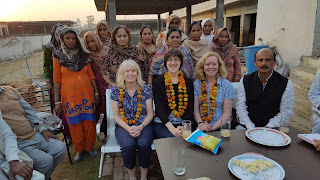Tackling Dangerous Dog
Legislation
On Wednesday 28th February Dr Amy Miele of JMICAWE
was invited to chair a Policy Exchange focussing on Dangerous Dog Legislation
in the UK which was held in central London. The aim of this exchange was to
foster interdisciplinary relationships, while also exploring alternatives to
the controversial Dangerous Dogs Act (DDA) of 1991 and its’ subsequent
amendments. Alongside this, delegates shared best practice with regards to
promoting responsible dog ownership and ensuring optimal canine and human
welfare under the current legislative framework.
Dr Amy Miele is the Programme Director of the online
learning MSc Clinical Animal Behaviour
The day included presentations from charities such as the
RSPCA, Dogs Trust and Born Innocent, as well as from London Assembly Members
and animal behaviour researchers working in the field. There was an emphasis on
evidence based practice and Dr Samantha Gaines, RSPCA, was the first to set the
scene with some statistics demonstrating the futility of breed specific
legislation and the need for standardised reporting of dog bite incidents in
order to inform appropriate preventative action. Dr Naomi Harvey, University of
Nottingham, echoed these sentiments and presented data highlighting the high
degree of within breed variation in behaviour traits. She emphasised that any
genetic impact on behaviour should be considered at the level of the individual
rather than the breed.
Ms Shaila Bux, Born Innocent, talked about the work that she
and her colleagues do to help the owners of dogs who have been seized under
Section 1 of the DDA. Her case studies highlighted concerns over the lack of
standardisation with regards to the assessment of seized dogs and the welfare
concerns that they face during prolonged periods of kennelling while awaiting
assessment.
Assembly Members Leonie Cooper and Steve O’Connell from
Labour and London Conservatives respectively, demonstrated the cross-party
agreement on this important subject and discussed ways of promoting policy
change. The day also included a presentation from Hollie Sevenoaks of Dogs
Trust, who spoke about various Dogs Trust initiatives promoting responsible
dog ownership. So far, Dogs Trust has reached over 330, 000 school
children via their primary school workshops and they are in the process of
analysing data that will inform on the impact of this work.
Delegates included Clinical Animal Behaviourist Kendal
Shepherd, an experienced expert witness and Walter Pennell, a Dog Liaison
Officer from South Wales Police, both of whom shared their wisdom and stories
of best practice within the limitations of the current legal framework.
While the day uncovered severe flaws in the current
Dangerous Dog legislation in the UK, the concluding remarks were positive, with
a focus on continuing to build upon the cross-sector relationships forged
during the day and fostering change, while also supporting initiatives focussing on public education and responsible pet-ownership.
Teaching children how to behave around dogs and about
responsible dog ownership was one of the key initiatives discussed during the
Policy Exchange













